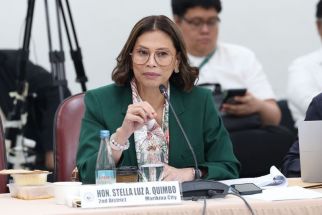Energy of politics, politics of energy

August 22, 2005 | 12:00am
There have been so much hue and cry by the people over the continuing increases in the prices of gasoline and other refined petroleum products even before the prevailing political turmoils rocked the country earlier this year.
These, however, have not apparently drowned the political noises all over the place.
Despite these renewed loud outcries on the seeming unending increases in the gasoline pump prices at every two weeks interval, our country’s leaders still find politics in discussing ways to solve this particular national problem.
If it is any consolation, the present crisis involved only rising oil prices but it has nothing to do with any supply shortage as in the case of the 1972 oil crisis due to the Iran-Iraq war that disrupted the supply chain and caused much economic hardships to many countries like the Philippines.
Lessons learned from that point of history, I distinctly recall President Arroyo and her top Cabinet advisers drew up contingency plans in anticipation of the various scenarios that would arise in the Philippines as a consequence of the pre-emptive military strikes launched in Iraq in 2003 by the US-led international coalition against terrorism.
This gave birth to the Middle East Preparedness Team (MEPT) as the special inter-agency body which Mrs.Arroyo tasked to come up with contingency measures in case of a prolonged war in Iraq.
The MEPT specifically focused on two major concerns of the government, namely, the impact of a prolonged war in Iraq to the safety and well-being of about two million of our overseas Filipino workers (OFWs) who were spread all over the Gulf region and to its effects on the domestic price and supply of our imported crude oil needs.
Former Department of Energy (DOE) Secretary Vicente "Vince" Perez, a member of the MEPT, was the chief architect of the various oil, power, and other energy-related contingency measures that included mandatory energy conservation at the very least and fuel rationing in the worst case scenario.
Except for the usual rhetorics of those opposed to such contingency measures as being extreme during those peaceful political times in our country, fortunately for all of us, the feared oil crisis did not materialize.
So I did not find anything new with these contingency measures announced last week by DOE Secretary Raphael Lotilla on the government’s new round of energy conservation directives under Administrative Order (AO) 126 and his warning of a possible enforcement of a fuel rationing scheme.
Unlike his DOE predecessor, Lotilla does not have the luxury of peaceful political environment to gain wide support for these contigency measures, no matter how serious the threats of a full-blown oil price crisis in the country.
With the cloud of doubts over the leadership of President Arroyo following the wiretapping scandal, the Arroyo administration have no choice but to show the lead and implement the energy conservation measures as started by the government if it wish to get the support of the political opposition and the cooperation of the Filipino people at large.
In a meeting at Malacañang Palace last Friday, Lotilla forged agreement with oil company executives on energy conservation measures like cutting business hours of gas stations which Mrs.Arroyo noted enabled countries like Thailand to save as much as five percent of its energy consumption.
But what I could not understand is why these energy conservation measures, particularly the four day work-week, is being forced upon again to all government offices which could further worsen only public service being rendered to our people. Why not just implement daylight saving time?
And why are these energy conservation measures directed to the productive sectors of the economy instead of zeroing in to real sources of wasteful use of power, fuel and energy?
Take for instance the so much electricity that would be saved if the daily, 24-hour casino operations would be shortened or cut the six-days-a-week in the horseracing, or ban car racing and other fuel-guzzling races and games.
There should also be a ban on moving advertisements on board trucks which would not only save gasoline but also lessen traffic jams.
This real threat of runaway increase in gasoline prices is before us, especially in case the Supreme Court (SC) lifts its temporary restraining order on the implementation of Republic Act (RA) 9337 or the expanded value added tax (EVAT) law in which power and oil products, among other previously EVAT-exempted, would henceforth pay ten percent VAT.
In my recent chat with Bureau of Internal Revenue (BIR) commissioner Jose Bunag, he told me they estimated the price effect of EVAT to gasoline consumers would range from P4 to P6 per liter.
Citing computations by the Manila Electric Co.(Meralco), Bunag said the price effect of EVAT on electricity rates would range from 70 centavos per kilowathour to as much as P1 that would be passed on by power generators to electric users since VAT is direct consumption tax.
These dire prospects should open the eyes and minds of our leaders to the clear and present danger of the oil price crisis in our country.
Whatever are the political charges and counter-charges by those in the Arroyo administration and the opposition, their energy of politics and the politics of energy must meet somewhere on common grounds.
If only such high-powered energy of politics in the country could be turned into more productive use, it could be a veritable deep well of renewable energy source.
But many of our leaders have conveniently glossed over the awesome power of politics of energy in our country that they become perhaps the witting, or unwitting, pawns of its reign of control to an oil-dependent country like ours.
Industrialist Raul Concepcion, head of his own Consumer Oil Price Watch, vows to exercise the political will to do something about these seeming unrestrained price hikes by the so-called "big three," namely, Shell, Caltex and Petron, if nobody in the government would initiate any actions to protect the consumers.
Invoking Section 14 of the Oil Deregulation Law, Concepcion is set to file formal complaints of alleged violations of this law before the Joint Task Force of the Department of Justice and DOE to restrain new gasoline price increases slated this week. Hold on to your horses, or should I say, to your bicycles.
Write to [email protected]
These, however, have not apparently drowned the political noises all over the place.
Despite these renewed loud outcries on the seeming unending increases in the gasoline pump prices at every two weeks interval, our country’s leaders still find politics in discussing ways to solve this particular national problem.
If it is any consolation, the present crisis involved only rising oil prices but it has nothing to do with any supply shortage as in the case of the 1972 oil crisis due to the Iran-Iraq war that disrupted the supply chain and caused much economic hardships to many countries like the Philippines.
Lessons learned from that point of history, I distinctly recall President Arroyo and her top Cabinet advisers drew up contingency plans in anticipation of the various scenarios that would arise in the Philippines as a consequence of the pre-emptive military strikes launched in Iraq in 2003 by the US-led international coalition against terrorism.
This gave birth to the Middle East Preparedness Team (MEPT) as the special inter-agency body which Mrs.Arroyo tasked to come up with contingency measures in case of a prolonged war in Iraq.
The MEPT specifically focused on two major concerns of the government, namely, the impact of a prolonged war in Iraq to the safety and well-being of about two million of our overseas Filipino workers (OFWs) who were spread all over the Gulf region and to its effects on the domestic price and supply of our imported crude oil needs.
Former Department of Energy (DOE) Secretary Vicente "Vince" Perez, a member of the MEPT, was the chief architect of the various oil, power, and other energy-related contingency measures that included mandatory energy conservation at the very least and fuel rationing in the worst case scenario.
Except for the usual rhetorics of those opposed to such contingency measures as being extreme during those peaceful political times in our country, fortunately for all of us, the feared oil crisis did not materialize.
So I did not find anything new with these contingency measures announced last week by DOE Secretary Raphael Lotilla on the government’s new round of energy conservation directives under Administrative Order (AO) 126 and his warning of a possible enforcement of a fuel rationing scheme.
Unlike his DOE predecessor, Lotilla does not have the luxury of peaceful political environment to gain wide support for these contigency measures, no matter how serious the threats of a full-blown oil price crisis in the country.
With the cloud of doubts over the leadership of President Arroyo following the wiretapping scandal, the Arroyo administration have no choice but to show the lead and implement the energy conservation measures as started by the government if it wish to get the support of the political opposition and the cooperation of the Filipino people at large.
In a meeting at Malacañang Palace last Friday, Lotilla forged agreement with oil company executives on energy conservation measures like cutting business hours of gas stations which Mrs.Arroyo noted enabled countries like Thailand to save as much as five percent of its energy consumption.
But what I could not understand is why these energy conservation measures, particularly the four day work-week, is being forced upon again to all government offices which could further worsen only public service being rendered to our people. Why not just implement daylight saving time?
And why are these energy conservation measures directed to the productive sectors of the economy instead of zeroing in to real sources of wasteful use of power, fuel and energy?
Take for instance the so much electricity that would be saved if the daily, 24-hour casino operations would be shortened or cut the six-days-a-week in the horseracing, or ban car racing and other fuel-guzzling races and games.
There should also be a ban on moving advertisements on board trucks which would not only save gasoline but also lessen traffic jams.
This real threat of runaway increase in gasoline prices is before us, especially in case the Supreme Court (SC) lifts its temporary restraining order on the implementation of Republic Act (RA) 9337 or the expanded value added tax (EVAT) law in which power and oil products, among other previously EVAT-exempted, would henceforth pay ten percent VAT.
In my recent chat with Bureau of Internal Revenue (BIR) commissioner Jose Bunag, he told me they estimated the price effect of EVAT to gasoline consumers would range from P4 to P6 per liter.
Citing computations by the Manila Electric Co.(Meralco), Bunag said the price effect of EVAT on electricity rates would range from 70 centavos per kilowathour to as much as P1 that would be passed on by power generators to electric users since VAT is direct consumption tax.
These dire prospects should open the eyes and minds of our leaders to the clear and present danger of the oil price crisis in our country.
Whatever are the political charges and counter-charges by those in the Arroyo administration and the opposition, their energy of politics and the politics of energy must meet somewhere on common grounds.
If only such high-powered energy of politics in the country could be turned into more productive use, it could be a veritable deep well of renewable energy source.
But many of our leaders have conveniently glossed over the awesome power of politics of energy in our country that they become perhaps the witting, or unwitting, pawns of its reign of control to an oil-dependent country like ours.
Industrialist Raul Concepcion, head of his own Consumer Oil Price Watch, vows to exercise the political will to do something about these seeming unrestrained price hikes by the so-called "big three," namely, Shell, Caltex and Petron, if nobody in the government would initiate any actions to protect the consumers.
Invoking Section 14 of the Oil Deregulation Law, Concepcion is set to file formal complaints of alleged violations of this law before the Joint Task Force of the Department of Justice and DOE to restrain new gasoline price increases slated this week. Hold on to your horses, or should I say, to your bicycles.
BrandSpace Articles
<
>
- Latest
- Trending
Trending
Latest
Trending
Latest
Recommended

























